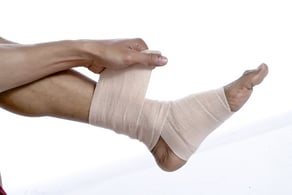 If you have had surgery, good surgical wound care is important to ensure proper healing and recovery, prevention of excess scarring, and protection against infections and other complications. Once you are discharged from the hospital, the responsibility for that care will rest primarily on your shoulders and will include caring for the incision, cleaning the wound, changing dressings, applying any prescribed topical treatments, taking antibiotics or other medications as directed, and monitoring the wound for signs of infection.
If you have had surgery, good surgical wound care is important to ensure proper healing and recovery, prevention of excess scarring, and protection against infections and other complications. Once you are discharged from the hospital, the responsibility for that care will rest primarily on your shoulders and will include caring for the incision, cleaning the wound, changing dressings, applying any prescribed topical treatments, taking antibiotics or other medications as directed, and monitoring the wound for signs of infection.
Incision Care
Your incision may be closed with stitches, staples, or surgical glue. Staples will be removed by your surgeon when healing has progressed sufficiently. Stitches will either be removed by your surgeon or may dissolve on their own over time. Surgical glue wears off on its own within 5 to 10 days.
Good incision care generally includes spending some time over the first few days of recovery elevating the incision – above the level of your heart – to reduce pain and swelling and promote healing. Do not pull on stitches, staples, adhesive strips, or surgical glue. Surgical wounds often begin to itch, sometimes intensely, as they heal, but it is important to not scratch them. Avoid exposing your incision to sunlight, and do not immerse the incision in water until your surgeon says it is safe – stick to sponge baths and, if your surgeon approves, showers for bathing. If there is bleeding from the incision, apply firm pressure with a clean towel for at least 5 minutes. If bleeding continues or worsens after applying pressure, call your doctor.
Dressing Changes
Your surgical wound will generally be covered with a sterile dressing when you are discharged from the hospital, which is meant to absorb any fluids leaking from the incision and to keep it clean, dry, and protected against bacterial contamination. Your health care team should give you detailed instructions as to how dressings are to be changed and how often.
Important steps to take as you prepare to change your dressing include removing jewelry from your hands and wrists, since it can harbor and transfer bacteria, washing your hands with soap and warm water for 15 to 30 seconds, rinsing your hands thoroughly, and drying them with a clean towel. Then, wearing a medical glove, remove the soiled dressing, placing both the glove and the dressing in a plastic bag. Wash your hands again before carefully following your surgeon's instructions for cleaning your incision, applying any prescribed topical medications and applying a new dressing.
Preventing Complications During Recovery and Rehab
Aside from proper care of incisions and dressings, other good ways to reduce your risk of complications and promote healing include:
- Eating well to support your immune system
- Staying well-hydrated
- Observing activity limitations imposed by your healthcare team
- Getting plenty of rest
- Avoiding tobacco use, which can impair healing
- Taking prescribed medications exactly as directed
If affordability is an issue, do not discontinue medications on your own. Instead, speak to your doctor about available resources, such as patient assistance programs, that can offer help in obtaining the medications you need.
Even the best surgical wound care cannot totally eliminate the risk of complications, so it is very important to watch the wound carefully for signs of developing issues. Check daily for symptoms of infection, including increased pain and/or swelling, redness, or warmth; white pimples or blisters around the incision; pus or increased drainage; and fever. Additionally, any sign of separation in the incision is cause for concern. If you observe any of these changes, see your doctor for an examination as soon as possible.





